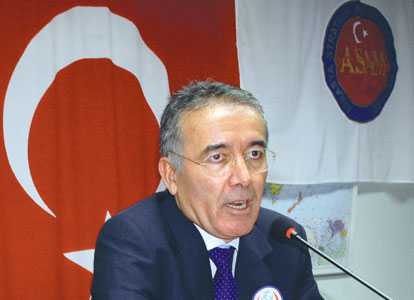
ISTANBUL (Hurriyet)–Delegates from Turkic countries gathered Thursday in Istanbul at the World Turkic Forum to highlight the common ties among their countries while promoting steps toward the creation of a more overarching Turkic identity.
“In a globalized world, we want to spread our message to the world as Turkic citizens,” said Nazim Ibrahimov, Azerbaijan’s Diaspora minister.
Participants made many references to the Silk Road and military conquests in the same breath as goals for the countries to unite under a common set of values.
“The main target of the forum is to improve our values, expand our national values and make them international,” said Mahir Yagcilar, the minister of environment for Kosovo, which has a sizeable Turkish population. “The Turkish Republic is the mainland.”
Ahat Andıcan, a former state minister and professor at Istanbul University, echoed Ibrahimov’s call, saying: “In the 21st century, we will be the part [of the world] that is shaping the world. We should. We must.”
Many proposed that Turkey adopt the role of steward and leader for the Turkic world. But the idea didn’t receive unanimous support, with some delegates raising issues with the notion.
“Our main problem is that we can’t put forward a country as the regional leader. We lack a regional state that will pile up the other countries under its roof,” said Fazil Mustafa, a member of the Azerbaijan National assembly.
Turkey, in the past, had been unable to fulfill this role, Mustafa said, citing as evidence the country’s inability to prevent the Armenians of Nagorno-Karabakh from breaking free from Azeri rule.
Meanwhile, Hakan Kirimli of Bilkent University said Turkey’s most important task was to first protect the Turkic diaspora within its own borders, including Tatars, Kazakhs, Turkmens, and people from the Caucasus, Crimea, and the Balkan area.
He said many of these diaspora groups in Turkey actually outnumber the population of their groups in their own homelands. “Protecting those societies means protecting a whole culture.”
Pinar Akcali from Middle East Technical University said Turkey’s improving relationship with Turkic countries was partly the result of its deteriorating relationship with the West and added that such a trend would give Turkey a chance to develop its relations with other parts of the world, including the Turkic one.
Although some Turkic countries are performing well economically and others have the benefit of natural resources, many Turkic countries are not particularly rich economically, according to Mustafa. “The 21st century, in terms of the economy, will not be a Turkic century,” he said.
There are also many political problems between Turkic countries, with Hasan Ali Karasar calling attention to the brutal violence that has sporadically occurred between the local Uzbek community and ethnic Kyrgyz in Kyrgyzstan.
“For four years we have been discussing how to improve inter-Turkic relations,” said Karasar. “Still the government [of Kyrgyzstan] has not been effective. The Kyrgyz president made some important steps. Luckily we have stopped the violence – for now.”

Leave a Reply